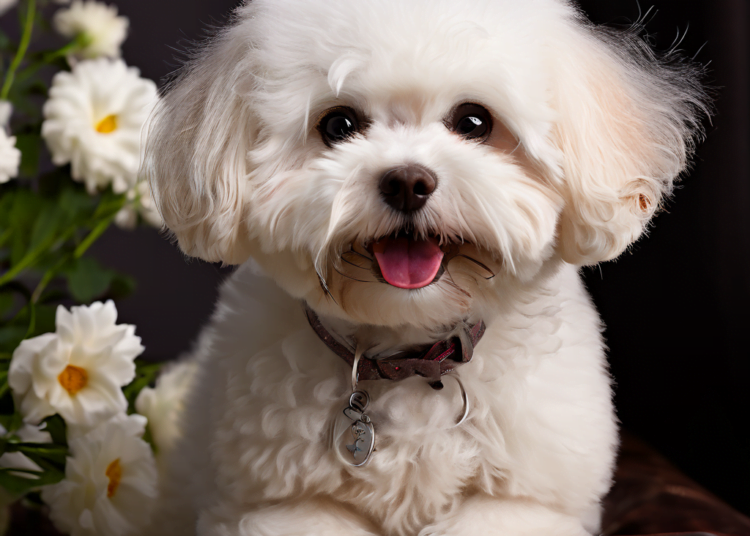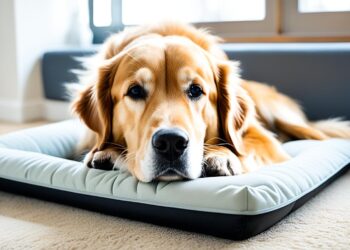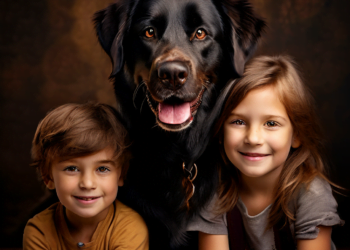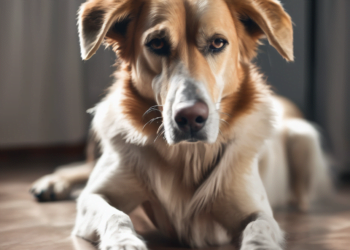Welcome to our comprehensive Bichon Frise Care Guide, where we provide essential tips and advice for nurturing your Bichon Frise and ensuring their overall health and happiness. The Bichon Frise is a lovable, hypoallergenic breed known for its fluffy white coat, playful temperament, and intelligence. This guide covers everything from grooming techniques to understanding their unique health needs and training their sometimes stubborn nature. Whether you’re a proud owner or considering adding a Bichon Frise to your family, this guide will equip you with the knowledge and insights to provide the best care for your adorable companion.
Key Takeaways:
- Bichon Frises are hypoallergenic dogs, making them a great choice for allergy sufferers.
- Grooming is essential to Bichon Frise care to maintain their non-shedding coat.
- Regular vet check-ups and proper nutrition are crucial for maintaining your Bichon Frise’s health.
- Socialization and training are important for a well-balanced and obedient Bichon Frise.
- Creating a safe home environment and providing mental stimulation are key to a happy Bichon Frise.
Table of Contents
Understanding the Bichon Frise Breed
It’s essential to understand this unique breed well to provide the best care for your Bichon Frise. Known for their small size and adorable appearance, Bichon Frises are one of the most popular small dog breeds. Their fluffy white coats make them stand out, and their intelligence is remarkable for a small dog breed. But what truly sets them apart is their natural ability to be excellent companion dogs.
Bichon Frises are known for their friendly and affectionate nature, making them perfect for individuals or families seeking a loyal and loving pet. Despite their size, Bichon Frises have a big personality, always ready to bring joy and companionship to their owners.
Now, let’s take a closer look at the key features that make the Bichon Frise breed so special:
- Small size: Bichon Frises are small dog breeds, which makes them ideal for apartment or urban living.
- Fluffy white coat: The Bichon Frise’s signature feature is its luxurious and fluffy white coat, which requires regular grooming to keep it looking its best.
- Intelligence: Don’t let their cute appearance fool you – Bichon Frises are highly intelligent dogs. This intelligence makes them quick learners and eager to please during training sessions.
- Companion dogs: Bichon Frises thrive on human companionship and make excellent emotional support animals. They love being part of the family and enjoy spending quality time with their owners.
Now that we’ve covered the basics of the Bichon Frise breed, it’s time to dive into the specific care tips that will ensure the health and happiness of your Bichon Frise companion.
Grooming: Keeping Your Bichon Frise Looking Impeccable
Grooming is an essential aspect of caring for your Bichon Frise. Regular grooming sessions help maintain their adorable appearance and contribute to their overall health and well-being. As non-shedding dogs, Bichon Frises require special attention to keep their coats pristine.
Regular Brushing: Brushing your Bichon Frise’s coat is a crucial grooming practice. It helps remove dirt, tangles, and loose hair, preventing matting and promoting healthy growth. Use a slicker brush or a comb with wide teeth to brush their long, silky fur gently. Aim to brush your Bichon Frise thrice weekly to keep their coat smooth and free from knots.
Trimming and Styling:
Regular trimming and styling are necessary for your Bichon Frise to maintain a well-groomed appearance. Consider taking them to a professional groomer every 6-8 weeks for a full haircut. This helps manage their hair length and prevents it from becoming too unruly. Alternatively, you can learn basic trimming techniques and maintain their coat at home. Keep their hair around the eyes, ears, paws, and bottom trimmed to ensure cleanliness and avoid discomfort.
Bathing and Hygiene:
Like humans, Bichon Frises need regular bathing to clean their skin and coat. Use a mild dog shampoo your veterinarian recommends and ensure thorough rinsing to prevent skin irritations. It’s important not to overdo bathing, as excessive washing can strip their coat of natural oils, leading to dryness. Aim to bathe your Bichon Frise every 2-4 weeks or as needed, depending on their activity level and cleanliness.
Ear Cleaning: Due to their fluffy ears, Bichon Frises are prone to ear infections. Regularly check and clean their ears using a dog-safe ear-cleaning solution and cotton pads. Gently wipe the inside of their ears, removing dirt or debris to prevent moisture buildup that can lead to infections.
Tooth Care: Dental hygiene is crucial for your Bichon Frise’s overall health. Brush their teeth regularly using a dog-specific toothbrush and toothpaste. This helps prevent tartar buildup, gum disease, and bad breath. Additionally, provide dental chews or toys to promote healthy teeth and gums.
Nail Care:
Trimming your Bichon Frise’s nails is important to their grooming routine. Overgrown nails can cause discomfort and affect their mobility. Use a dog nail clipper or grinder to carefully trim their nails, taking care not to cut into them quickly. If you’re unsure, a professional groomer or veterinarian can assist you in safely trimming your nails.
| Grooming Practice | Benefits |
|---|---|
| Regular brushing | Prevents matting, removes dirt and loose hair |
| Trimming and styling | Maintains neat appearance, prevents discomfort |
| Bathing and hygiene | Keeps skin and coat clean, prevents skin irritations |
| Ear cleaning | Prevents ear infections |
| Tooth care | Prevents dental issues, promotes fresh breath |
| Nail care | Ensures comfort and proper mobility |
Ensuring a Healthy Lifestyle for Your Bichon Frise
When it comes to maintaining the health of your beloved Bichon Frise, there are several key aspects to focus on. By prioritizing proper nutrition, regular exercise, routine vet check-ups, and awareness of common health issues, you can ensure a healthy and happy life for your furry companion.
Nutrition: Providing a Well-Balanced Diet
Feeding your Bichon Frise a well-balanced and nutritious diet is essential for their overall health and well-being. Opt for high-quality dog food specifically formulated for small breeds, considering their age, size, and any specific dietary requirements they may have. Ensure their diet properly balances protein, carbohydrates, healthy fats, vitamins, and minerals while avoiding excessive fillers and artificial additives.
Exercise: Keeping Your Bichon Frise Active
Bichon Frises may be small, but they require regular exercise to stay fit and maintain a healthy weight. Aim for at least 30 minutes to an hour of daily exercise, including brisk walks, playtime in a secure yard, or engaging in interactive games such as fetch or agility training. Regular exercise helps keep them physically fit, provides mental stimulation, and aids in preventing behavioral problems.
Vet Check-ups: Monitoring Your Bichon Frise’s Health
Regular visits to the veterinarian are crucial for ensuring the ongoing health of your Bichon Frise. Schedule routine check-ups at least once a year, during which your vet can perform a thorough examination, administer necessary vaccinations, and monitor for any potential health issues. These check-ups also allow you to discuss concerns or ask questions about your Bichon Frise’s health and well-being.
| Common Health Issues in Bichon Frises | Description | Prevention |
|---|---|---|
| Patellar Luxation | A condition where the kneecap slips out of place, causing discomfort and lameness. | Regular exercise, maintaining a healthy weight, and avoiding excessive jumping can help prevent this condition. |
| Bladder Stones | Bichon Frises are prone to allergies, manifesting as skin irritations, itchiness, and gastrointestinal issues. | Provide fresh water at all times, feed a balanced diet, and ensure regular bathroom breaks to prevent the development of bladder stones. |
| Allergies | Regular grooming, a high-quality diet, and a clean living environment can help reduce the risk of allergies. | Regular grooming, a high-quality diet, and keeping a clean living environment can help reduce the risk of allergies. |
By proactively maintaining your Bichon Frise’s health, you can ensure they live a long and happy life. From providing a well-balanced diet to promoting regular exercise and keeping up with vet check-ups, you are taking the necessary steps to ensure your overall well-being.
Socialization and Training for a Well-Balanced Bichon Frise
Understanding the typical temperament of Bichon Frises is crucial for their socialization and training. These adorable little dogs are known for their friendly and affectionate nature, making them excellent companions. However, they can be stubborn sometimes, prioritizing training to ensure they grow into well-rounded and obedient pets.
Early exposure to various people, animals, and environments is key when socializing your Bichon Frise. Introduce them gradually to new experiences, providing positive reinforcement and rewards for good behavior. This will help them develop confidence and reduce any tendencies towards shyness or fearfulness.
Training a Bichon Frise requires patience and consistency. Positive reinforcement techniques like reward-based training work best for this intelligent breed. Use treats, praise, and playtime as rewards for desired behaviors, and avoid harsh discipline methods that can cause anxiety or fear.
One area of training that Bichon Frise owners often struggle with is housebreaking. Due to their small size, these dogs can be challenging to potty train. Establish a routine and take them outside frequently, especially after meals or naps. Consistency and positive reinforcement will help them understand where and when to relieve themselves.
Remember, a well-trained and socialized Bichon Frise will be a joy to have around and can easily adapt to different situations and environments. With proper training and socialization, you can ensure that your Bichon Frise becomes a well-behaved and balanced family member.
Creating a Safe Home Environment for Your Bichon Frise
When it comes to Bichon Frise care, creating a safe and welcoming home environment is crucial for their overall well-being. Here are some practical tips to ensure your furry companion feels secure and happy:
Setting up Their Living Space
Designate a specific area in your home for your Bichon Frise. This will become their personal space where they can relax and feel safe. Consider the following:
- Provide a comfortable dog bed: Choose a bed that is the appropriate size for your Bichon Frise, ensuring they have enough room to stretch and turn comfortably. Opt for a soft, washable bed that can be easily cleaned.
- Creating boundaries: Use safety gates or barriers to block off areas of the house that are unsafe for your Bichon Frise. This will prevent them from accessing hazardous spaces or getting into trouble.
Providing Appropriate Toys and Mental Stimulation
Bichon Frises are intelligent and playful dogs, so providing them with stimulating toys and activities is essential. This helps prevent boredom and destructive behaviors. Consider the following:
- Interactive toys: Choose toys that require mental engagement, such as puzzles or treat-dispensing. These will keep your Bichon Frise entertained while stimulating their cognitive abilities.
- Rotate toys: Introduce new toys regularly and rotate them to keep your Bichon Frise engaged and interested. This can help prevent them from getting bored with their toys.
Creating a Comfortable Sleeping Area
A good night’s sleep is essential for your Bichon Frise’s health and well-being. Create a comfortable sleeping area by considering the following:
- Selecting the right bed: Choose a cozy bed that properly supports your Bichon Frise’s joints. Orthopedic beds are a great option for older dogs or those with joint issues.
- Quiet and peaceful environment: Place the bed in a quiet area of the house where your Bichon Frise can rest without disruptions. Avoid placing the bed near TVs or loud appliances.
By following these tips, you can create a safe and nurturing home environment that promotes the well-being of your Bichon Frise.
| Tip | Description |
|---|---|
| Setting up Their Living Space | Designate a specific area in your home for your Bichon Frise, providing a comfortable dog bed and using safety gates to create boundaries. |
| Providing Appropriate Toys and Mental Stimulation | Choose interactive toys that require mental engagement and rotate toys regularly to prevent boredom. |
| Creating a Comfortable Sleeping Area | Select a cozy bed that provides proper support for your Bichon Frise’s joints and place it in a quiet and peaceful environment for uninterrupted sleep. |
The Importance of Exercise for Your Bichon Frise
Regular exercise is vital in keeping your Bichon Frise healthy and happy. Providing them with appropriate physical activity helps promote their overall well-being and prevents the buildup of excess energy. To ensure that your furry companion gets the exercise they need, consider the following exercise options and activities:
- Playtime: Engage in interactive play sessions with your Bichon Frise using toys such as balls, frisbees, or tug-of-war ropes. This helps them burn energy and strengthens the bond between you and your furry friend.
- Walks: Take your Bichon Frise for daily walks to allow them to explore their surroundings and get some fresh air. Aim for at least 30 minutes of brisk walking each day to ensure they receive sufficient exercise.
- Agility Training: Bichon Frises are gifted at agility, so consider enrolling them in agility classes or setting up a small obstacle course in your backyard to challenge their physical abilities.
- Swimming: If your Bichon Frise enjoys water, swimming can be a fun and low-impact exercise option for them. Supervise them closely and ensure they have a safe and suitable swimming area.
Remember to consider your Bichon Frise’s individual needs and physical abilities when planning your exercise routine. Consult your veterinarian for tailored advice if you have any concerns or questions.
Training Tips for a Well-Behaved Bichon Frise
When it comes to Bichon Frise training, it’s important to understand the unique characteristics of this breed and tailor your training methods to suit their needs. Bichon Frises are intelligent and eager to please, making them highly trainable. By using positive reinforcement techniques and patience, you can ensure that your Bichon Frise becomes a well-behaved and obedient companion.
Here are some essential training tips to help you on your journey:
- Start early: Begin training your Bichon Frise as soon as you bring them home. Establishing good habits and boundaries will set the foundation for a well-behaved dog.
- Use positive reinforcement: Bichon Frises respond best to positive reinforcement techniques such as rewards, praise, and treats. Use these incentives to encourage desired behaviors and discourage unwanted ones.
- Be consistent: Consistency is key when training your Bichon Frise. Use the same commands, gestures, and rewards consistently to reinforce their understanding of what is expected of them.
- Keep training sessions short: Bichon Frises have a relatively short attention span, so it’s important to keep them brief and engaging. Aim for multiple short sessions spread throughout the day rather than one long session.
- Focus on socialization: Bichon Frises are social dogs, so socialization plays a crucial role in their training. Expose your Bichon Frise to different environments, people, and other animals from a young age to help them develop good social skills.
- Seek professional help if needed: If you encounter difficulties during the training process, don’t hesitate to seek the assistance of a professional dog trainer with experience working with Bichon Frises.
Remember, training is an ongoing process. Reward the desired behaviors continuously and practice regularly to maintain your Bichon Frise’s training progress. With consistent training and positive reinforcement, you can enjoy a well-behaved and obedient Bichon Frise that brings joy to your life.
Bichon Frise and Allergies: Unleashing Hypoallergenic Joy
Finding a pet that won’t trigger allergy symptoms can be challenging for allergy sufferers. However, there is good news for those longing for a furry friend. Bichon Frises are hypoallergenic dogs, making them suitable choices for individuals with allergies.
Unlike other breeds that shed and produce dander, Bichon Frises have hair-like fur that grows continuously. This characteristic reduces the amount of dander they release into the environment, minimizing the risk of allergic reactions. Coupled with their adorable appearance and playful demeanor, Bichon Frises bring joy without compromising your health.
Managing allergies is crucial to creating a comfortable environment for you and your Bichon Frise. Regular grooming, including bathing and brushing, helps remove allergens from their coat and minimizes potential triggers. Additionally, keeping your home clean and free of dust and pet dander can reduce allergen exposure.
If you or a family member suffer from allergies, consider investing in air purifiers and allergy-resistant bedding to create an allergen-free zone for you and your furry companion. Taking these precautions will ensure a harmonious and hypoallergenic environment for everyone in your household.
Maintaining Mental Stimulation for a Happy Bichon Frise
Keeping your Bichon Frise mentally stimulated is essential for their well-being and happiness. As an intelligent dog breed, Bichon Frises thrive when provided with mental enrichment and activities that engage their sharp minds. By preventing boredom, you can ensure a content and satisfied furry companion.
“Mental stimulation is just as important as physical exercise for Bichon Frises. It helps prevent behavioral issues and keeps their minds sharp.” – Dr. Emily Scott, Veterinarian
Engaging Toys and Interactive Games
One way to keep your Bichon Frise mentally stimulated is by providing them with various engaging toys and interactive games. Look for puzzle toys requiring problem-solving skills, such as treat-dispensing or interactive puzzles. These toys provide mental challenges and encourage your Bichon Frise to think and strategize while having fun.
Pro Tip: Rotate your dog’s toys regularly to keep their interest levels high. Introduce new toys periodically to provide novel stimulation.
Training and Obedience Exercises
Incorporating regular training sessions into your Bichon Frise’s routine is an excellent way to stimulate their mind. Teach them new tricks, practice obedience commands, and engage in interactive training exercises. Not only does this mental stimulation keep them sharp, but it also strengthens the bond between you and your furry friend.
- Teach your Bichon Frise new tricks, such as “sit,” “stay,” or “roll over.”
- Engage in clicker training, where your dog must associate specific behaviors with a click sound and a reward.
- Participate in agility training, which involves navigating obstacle courses and developing problem-solving skills and coordination.
Brain Games and Problem-Solving Activities
Bichon Frises love a mental challenge. Consider incorporating brain games and problem-solving activities into their routine to keep their minds sharp and engaged.
| Brain Games | Problem-Solving Activities |
|---|---|
| Hide and Seek: Hide treats or toys around the house, encouraging your Bichon Frise to sniff them out. | Food Dispensing Toys: Use food puzzle toys that require your Bichon Frise to figure out how to get to the treats. |
| Scent Work: Engage in scent training, where your Bichon Frise uses its sense of smell to locate hidden items or treats. | Scent Work: Engage in scent training, where your Bichon Frise uses their sense of smell to locate hidden items or treats. |
Incorporating these mentally stimulating activities into your Bichon Frise routine can prevent boredom and promote a happy and content furry companion.
Conclusion
In conclusion, this comprehensive Bichon Frise care guide offers valuable insights and tips to ensure the well-being of your beloved furry companion. By focusing on grooming, health, training, and creating a nurturing environment, you can provide the love and attention that your Bichon Frise deserves.
Regular grooming practices, including brushing their non-shedding coat and maintaining their immaculate appearance, will keep your Bichon Frise looking their best. Additionally, prioritizing their health by providing proper nutrition, exercise, and regular veterinary check-ups will support their overall well-being.
Training is key to fostering a well-behaved Bichon Frise. It requires patience, positive reinforcement, and techniques tailored to the dog’s specific temperament. Creating a safe and stimulating home environment can ensure the Dog’s happiness and mental well-being.
Ultimately, following the advice outlined in this guide, you can establish a strong bond with your Bichon Frise and cultivate a joyful and fulfilling life together. Embracing their hypoallergenic qualities, intelligence, and companionable nature, you are equipped with the knowledge to provide the necessary care and attention to result in a happy and healthy Bichon Frise.
FAQ
What is a Bichon Frise?
The Bichon Frise is a small fluffy white dog breed known for its cheerful disposition and friendly nature. They make excellent companion dogs and are highly intelligent.
Are Bichon Frises hypoallergenic?
Yes, Bichon Frises are considered hypoallergenic dogs, making them a great choice for individuals with allergies. Their non-shedding coat produces less dander, reducing the likelihood of triggering allergic reactions.
How often should I groom my Bichon Frise?
Bichon Frises require regular grooming to maintain their fluffy coat and prevent matting. It is recommended to brush them at least 2-3 times a week and schedule professional grooming sessions every 4-6 weeks.
What is the temperament of Bichon Frises?
Bichon Frises are known for their friendly and affectionate nature. They are social and enjoy being around people and other pets. However, they can also be a bit stubborn at times and require consistent training and socialization.
How much exercise do Bichon Frises need?
Bichon Frises are a moderately active breed and require daily exercise to maintain their overall health and prevent weight gain. Daily walks, playtime, and mental stimulation through interactive toys are recommended.
What are some common health issues in Bichon Frises?
Bichon Frises are generally a healthy breed, but they may be prone to certain health issues such as dental problems, allergies, luxating patellas, and bladder stones. Regular vet check-ups and a balanced diet are crucial for their well-being.
How can I train my Bichon Frise?
Bichon Frises are intelligent and eager to please, making them trainable with positive reinforcement methods such as rewards, praise, and consistency. It’s important to start training early and be patient and persistent.
Can Bichon Frises live in apartments?
Yes, Bichon Frises can adapt well to apartment living as long as they receive regular exercise and mental stimulation. They are small in size and do not require a large living space, but they do need daily walks and playtime.
Are Bichon Frises good with children?
Bichon Frises are generally good with children and make great family pets. However, it’s important to supervise interactions between young children and dogs to ensure safety and teach children how to properly handle and treat the dog.
How long do Bichon Frises live?
Bichon Frises have an average lifespan of 12-15 years, although with proper care, some can live even longer. Providing a balanced diet, regular exercise, and routine vet care can contribute to their longevity.









